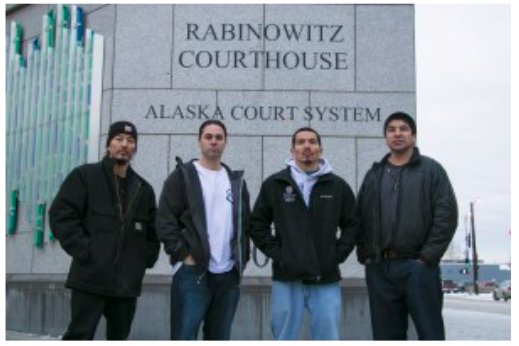JUDGE HOLLAND DENIES MONETARY DAMAGES
On Monday, Judge H. Russel Holland dismissed a civil lawsuit by four Alaska Native men who sought monetary damages against the City of Fairbanks, four named police officers and a handful of unnamed law enforcement officers.
The four, who became labeled by their supporters and attorneys the “Fairbanks Four,” are Marvin Roberts, Eugene Vent, Kevin Pease, and George Frese, were seeking millions of dollars in damages after their convictions were vacated in 2015.
The case stemmed from the brutal beating of John Hartman, a 15-year-old boy who in in October of 1997 was killed by, well, the conviction still says Roberts, Vent, Pease and Frese.
Their case became a political issue during the 2014 gubernatorial election, when the Alaska Federation of Natives confronted candidates for governor as they made presentations. Attendees held up four fingers to signify the Fairbanks Four and their wishes for the men to be released.
Attorney General Jahna Lindemuth was one of the attorneys seeking the mens’ release, before she was appointed attorney general by Gov. Bill Walker. They were released shortly after Walker became governor.
In exchange for having their convictions vacated in 2015, the four men had agreed in writing to release the State of Alaska and the City of Fairbanks, their departments, divisions, agencies, agents, representatives, and employees from any claims or lawsuits arising in any way concerning their arrest, investigation, or incarceration.
They had also agreed that the parties did not reach an agreement as to actual guilt or innocence.
[Read: Who killed John Hartman? Read the actual confessions.]
The settlement was negotiated by former Attorney General Craig Richards, was an insult to the original prosecution team. Several juries had concluded the defendants were guilty beyond a reasonable doubt.
The convictions had been upheld on appeal. Prosecutors believed that newly discovered evidence introduced by attorneys for the Fairbanks Four actually supported, rather than undermined, the earlier convictions.
In 2017, Marvin Roberts initiated the first lawsuit for monetary damages, followed by the other three. They sought to invalidate the provision of the settlement that bars civil claims for monetary damages, but they didn’t seek to invalidate any other terms of the settlement. To challenge any other part of it would have reinstated their convictions and sent three of the four back to prison. (By December 2015, Roberts had served his sentence and had been released on probation.)
The City of Fairbanks asked for the lawsuit to be dismissed. For one thing, the claims the men made were barred by their settlement agreement and the claims were in conflict with federal law.
Oral argument was heard earlier this month at the federal courthouse in Fairbanks.
In a 25-page opinion issued Oct. 22, Judge Holland tossed the lawsuit in its entirety.
Holland said that prior case law shows that a judgment in favor of the plaintiff “would necessarily imply the invalidity of his conviction or sentence . . . unless the plaintiff can demonstrate that the conviction or sentence has already been invalidated.” Although the Fairbanks Four convictions were vacated, they were never invalidated. Under federal law, that is an important distinction.
Read Judge Holland’s decision here:
Fairbanks Four-Order Granting Motion to Dismiss, October 22, 2018[2]
